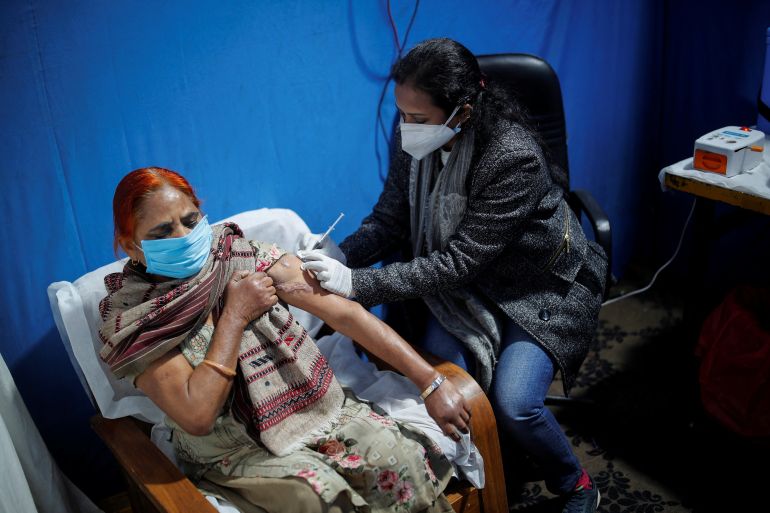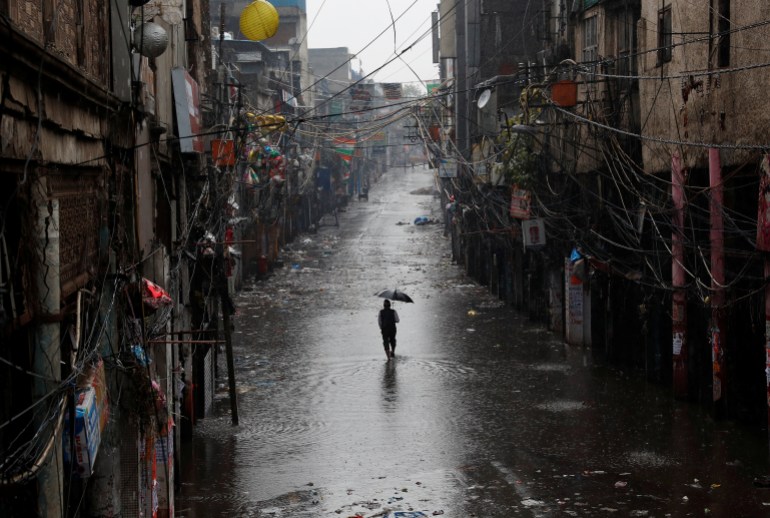India starts COVID booster shots for the vulnerable as cases rise
Healthcare and front-line workers along with people above 60 with health problems line up at vaccination centres amid Omicron variant surge.

India has begun administering booster doses of COVID-19 vaccine to front-line workers and vulnerable elderly people, with the fast-spreading Omicron variant driving an almost eight-fold rise in daily infections since the start of the year.
India reported 179,723 new cases on Monday, most of them in the country’s biggest cities – New Delhi, Mumbai and Kolkata – where Omicron has overtaken Delta as the most prevalent strain of the virus.
Keep reading
list of 4 itemsIndia COVID-19 cases skyrocket amid election campaign
India fears another COVID catastrophe as cases hit 7-month high
‘Third wave has set in’: India’s new COVID cases double in 4 days
There were 146 deaths reported on Monday, bringing the toll to 483,936 since the pandemic first struck India in early 2020. Only the United States and Brazil have recorded more deaths.
In recent days, hundreds of healthcare and front-line workers, including police, have contracted the virus, and there were media reports that hundreds of parliamentary staff have also tested positive ahead of a budget session on February 1.
Facing this rising third wave of infections, the government sent booster reminders to more than 10 million people who took their second dose of the Covaxin or Covishield shot nine months ago.
Unlike many countries, India is not mixing and matching vaccines.
Only healthcare personnel, front-line workers and people above 60 years suffering from other health conditions are eligible for what the government calls a “precaution dose”.
“The government is committed to provide additional security cover to healthcare and frontline workers on priority,” Health Minister Mansukh Mandaviya wrote on Twitter.
Despite the rise in infections, five states including the most populous Uttar Pradesh will hold regional elections starting February 10, though authorities have barred political party rallies until at least the middle of this month.

Tasked with protecting India’s near 1.4 billion people from the virus, the government has administered 1.5 billion vaccine doses in total. About 67 percent of the country’s 939 million adults have been double vaccinated and many have antibodies from previous infections.
This may provide “hybrid immunity” – a combination of immunity from previous infections and vaccines – comparable to boosters, said Dr Chandrakant Lahariya, an Indian epidemiologist.
Strain on health workers
India’s hospitals are short-staffed at the best of times and health workers are distributed unevenly across states.
Already, hospitals are becoming crippled as hundreds of health workers fall sick with the variant. Federal hospitals have been forced to relax quarantine rules and some have stopped routine services.
“Every third doctor is either symptomatic or positive. There is an acute shortage of staff. And there is an acute crisis,” said Dr Anuj Aggarwal at New Delhi’s Safdarjung Hospital, one of India’s largest government hospitals.
At the Rajendra Institute of Medical Sciences in Ranchi city, the capital of Jharkhand state in the east, a quarter of the 800 health workers were down with mild infections, said Dr Prabhat Kumar, in charge of COVID-19 treatment there.
The delay in providing boosters could be costly, said Dr T Jacob John, the former chief of virology at Christian Medical College in southern India. He said that having to administer third shots as a surge threatens to overwhelm hospitals would put an additional burden on health workers.
India’s overall COVID-19 testing has remained at about 1.5 million a day, well below the capacity of more than two million.
Since the pandemic began, India has recorded 35.7 million cases of COVID-19, the highest in the world after the US.
Government officials have privately said they are working under the assumption that daily infections will surpass the record of more than 414,000 set in May, based on what has happened in countries like the US, where daily cases have risen past one million.